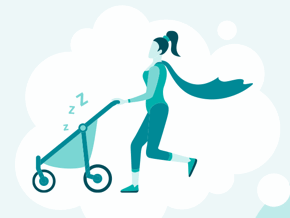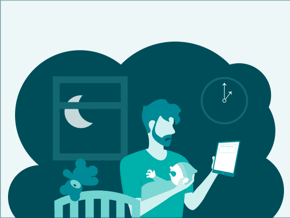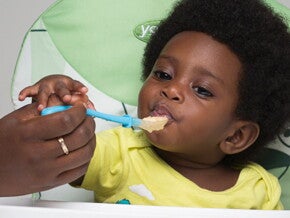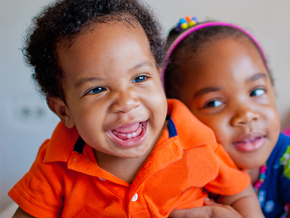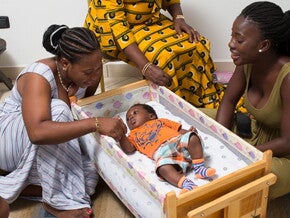
Feeling lonely in a hyperconnected World?
Bringing a child into the world can foster a deep sense of collaboration between the expecting parents, but once the baby arrives, the realities of caring for the child and financially supporting the family become the new priorities.
Bringing a child into the world can foster a deep sense of collaboration between the expecting parents, but once the baby arrives, the realities of caring for the child and financially supporting the family become the new priorities. Often, these are pursued in a “divide and conquer” approach where one partner takes on the responsibility of childcare while the other returns to work. In a way, this could be seen as a continuation of the collaboration forged during the pregnancy; the reality, however, is that each of these roles can be isolating in its own unique way. Although an encouraging shift is happening with more dads and partners staying home to care for the baby, in countries across the globe it’s still primarily the moms who are home alone in the first month after birth experiencing the highest levels of loneliness.
For the partner providing the childcare, life quickly becomes all about the baby, with little to no room for their own life, social or otherwise. At the same time, the working partner may feel cut off from the nurturing routines of parenthood and the baby’s development. In each scenario, the parent is faced with his or her own feelings of isolation and loneliness, which can be hard to see from the outside looking in.
New parents often make a show of happiness and contentment to those around them, whether to manage people’s perceptions, or to ward off their own insecurities. It can be difficult to get new parents to communicate how they truly feel, even with close family and friends. Many fear they’ll seem inadequate, or ashamed about making the experience about them and not solely about the baby.
New moms often find themselves in a “loneliness paradox” – an overwhelming feeling of loneliness with a beloved baby in their arms. Cooped up at home with little to no interaction with anyone but the child, a new mom may feel as though she’s lost her own identity—as a woman, a friend, a partner, and a professional—forced to make compromises she never saw coming. New moms can also experience post-partum depression and loneliness, which can only amplify these feelings of disconnection and isolation.
For many new parents, the only way to participate in the world outside the home is through social media. While these platforms offer a way for new parents to remain connected with friends and family, they can also be a sobering reminder of their former lives and freedoms, before they were inundated with responsibilities. Every post from a friend—a get together, a work event, a vacation photo—becomes a double-edged sword, sparking a complex feeling of connection and disconnection all at once. The isolated parent may feel like a rift has formed between their old life and the new, accompanied, perhaps, by a crisis of identity – “I used to be so outgoing and fun. Now I’m just a robot stuck in the house.”
But that’s not to say social media is the only culprit. New parents can feel out of step the moment they leave the house, attempting to engage with an outside world that seems to be bustling along without them. Keeping up with friends, the news, pop culture – all of these things beg for time they no longer have. It can make parents feel like no one around them understands them and what they’re going through. What’s worse, these feelings of isolation can make people sink inward rather than reaching out for help.
Suffering some of the highest rates of loneliness, the UK has adopted a very public and active anti-loneliness initiative, promoting an openness around the subject and encouraging people to talk about it. They’ve even appointed a Minister of Loneliness to spearhead the movement.
Saudi Arabia is another country experiencing high levels of loneliness, especially with moms expected to stay home with their young children, essentially cutting them off from any type of social life or feeling integrated within the larger community. In China, new moms are expected to submit to a “one-month confinement” directly following the baby’s birth in which they’re not allowed to leave the house, see visitors, or engage in any activity outside of caring for the child—not even showering.
Conversely, in Spain—where shared parenting is more of a norm— young parents seem to have far less trouble with loneliness, if only because they’re managing the responsibilities together. Spaniards feel deeply tied to their communities even as they transition into parenthood. Having a child doesn’t separate them from their social lives—if anything, the child is simply an extension of the couple, seamlessly incorporated into their daily lives.
Today, as the world adopts a more mindful view of mental health, managing loneliness is at the heart of the effort. Although some countries like Nigeria are still working through cultural stigmas around loneliness and mental health, the UK is a good example of where the world may trend in the future, taking a more holistic view of citizens’ health and a corrective approach to the expectations, assumptions and cultural nuances around parenting.
One way that we can all be more sensitive to the loneliness of others, especially in this highly connected age, is to be more direct with the way we reach out to the people in our lives—whether that’s looping them into a conversation on a group chat, offering words of encouragement and praise over social media, or simply arranging a one-on-one catch up session. All of these send a reaffirming message of appreciation and belonging and can make an enormous difference in a person’s daily life.
While technology may often seem like the culprit for our ever-intensifying feelings of isolation, it might also be our most powerful ally in defending ourselves against it. Perhaps if we approach our digital lives as an organic extension of our truest selves, we can enjoy a more fluid, conscious and constructive life both online and off – where a positive comment feels less like a “thumbs up” icon and more like a much-needed hug.
Discover the findings from our Parenting Index 2021 study www.theparentingindex.com
